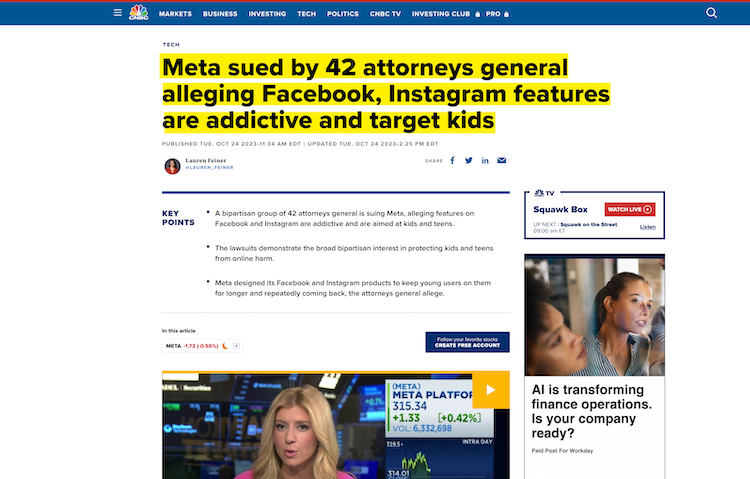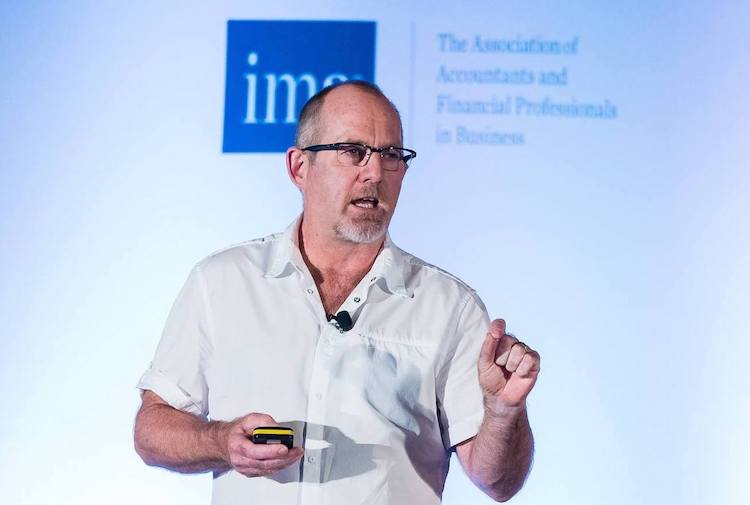Is the latest Meta lawsuit missing the point?
In response to the recent lawsuit by more than 30 states against Meta and its companies, accusing them of fueling the teen mental health crisis, Meta is likely to use in its defense decades of independent and expert research that says there’s simply no proven connection.
There clearly must be a connection, but where and what is it? That’s where it can get complicated.
The discussion below tries to separate fact from hype, and presents the most troubling and yet exciting part of the whole story.
That it’s less about mental health and more about brain health.

Meta Accused Of Contributing To The Teen Mental Health Crisis But Decades Of Research Suggest Otherwise
Hundreds of studies over the last decade have found little if any connection between social media and/or technology use by teens, and the mental health of those teens:
- An analysis by Stanford University of 226 studies conducted over 12 years and including more than a quarter of a million participants found no solid connection. Learn more.
- A major study in 2021 by the University of Oxford of more than 400,000 participants also came to the same conclusion. Learn more.
- A second study from Oxford University published in August of this year, of nearly 1 million participants in 72 countries, also came to the same conclusion. Learn more.
Meta is already using these studies in its defense.
The Lawsuit Is Right, It’s About Addiction
When Pulitzer-nominated author Max Fisher investigated Facebook and its algorithms, he concluded that they were deliberately constructed to be as addictive as possible to young minds, in spite of the known harm. This was later confirmed by Facebook insider and whistleblower Francis Haugen who testified before Congress. Read more.
But Is It More About Brain Health Than Mental Health?
With all the focus on mental health, we might be missing the biggest danger – brain health. The overuse of social media can deprive kids and teens of activities, habits, and routines that are key to brain health and growth.
Max Fisher, the author of The Chaos Machine, who was given unprecedented access to Facebook’s algorithms, points out that social media is warping and rewiring the minds of kids and negatively changing the way they think, make decisions, and interact with each other and the world. Learn more.
An Opportunity To Capitalize On Brain Health
The debate over social media and teen mental health is a fantastic opportunity to introduce discussions on the real and more urgent challenge – the brain health of teenagers, and a much more positive and motivational alternative.
Teens will be more empowered and better off if they understand the addictive and manipulative nature of social media, and understand how to process what they’re being fed so they can still get the best from it without having to endure and suffer from the worst.
And the bonus is that healthy brain habits can also set kids and teens up for the best life.
So Is Social Media Off The Hook?
Absolutely not! For all the positive benefits of social media, they come at a high price and especially for kids and teens. Social media algorithms are designed to be addictive and manipulative, with the sole purpose of keeping kids and teens returning as often as possible and staying as long as possible in order to drive advertising revenue.
Researchers have pointed out that social media is not completely harmless to mental health either. Those already struggling with mental health problems are more likely to have negative experiences on social media.
Excessive Social Media Use Is Not The Cause But The Consequence
There are more than a dozen different reasons for the teen mental health crisis. Everything from climate anxiety, to political and social division, to school and community violence, to relentless pressure to do well, global wars and conflicts, COVID and so on.
Rather than the cause, social media is merely the escape. Much easier to lose yourself in relentless reels, for hour after hour, than deal with the reality of living.
Stunting Social, Emotional, And Brain Growth
Another harm that social media is doing to the emotional and brain growth of our kids is that it’s taking them away from other more important things that are key to growth and development of adolescent minds. And especially play. Learn more.
MEET THE AUTHOR
Neal O’Farrell is an award-winning cybersecurity expert who spent years exploring the relationship between brain health and mental health, in an effort to understand his own decades of mental health issues.
He recently launched The Brainisphere to teach teens how to use the basic pillars of brain health to set themselves up for a healthier, happier, and more successful life.
(Ironically, a couple of years ago he spoke at the headquarters of Facebook on the topic of the worrying growth of surveillance capital.)
